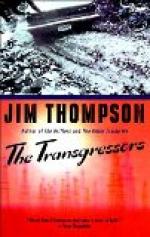In all the evening papers the announcement appears that Harvey Trueman is to start on a tour of the East. The fact that he will leave the city by train from the Union Depot is carefully suppressed, except in the two comparatively unimportant journals which advocate the election of the people’s candidate.
But the managers of Trueman’s campaign have come to know what has to be combatted. Handbills are hurriedly printed and distributed in the late afternoon along State, Clark and Dearborn streets, and on the intersecting streets in the centre of the business locality. These hand-bills announce that Trueman will deliver his farewell speech to Chicagoans that night at seven o’clock at the Adams street Bridge.
At six o’clock the crowds begin congregating; they come from all sections of the city; they are of every type, from the cowboy of the Stock Yards to the Street Railway Magnate. All are intent on hearing the captivating orator.
Ten thousand people huddle in an area of five blocks. They know that they all cannot hear Trueman; yet they hope to catch a glimpse of him, and perhaps hear him make a short speech in their immediate neighborhood.
It is 6.50 when a hansom conveying Trueman hurries down Adams street from State. The crowds cheer and yell. From a trot the horse attached to the vehicle is forced to proceed at a walk.
“Speech! speech!” cry the excited men as they surge through the narrow thoroughfare.
Trueman stands up in the hansom and leaning forward explains that he cannot stop to make a speech at every corner.
The few words he addresses to the crowd seem to satisfy their demands, and they at once subside.
Slowly the speaker approaches the throng at the Depot steps. In crossing the bridge he twice has to comply with the persistent demand for a speech.
Now he is on the platform.
His voice works a magic spell on the audience. They have been boisterous, fretful, even at times disorderly. Not a dozen words are uttered by Trueman and the silence, save for his ringing voice, is intense.
“I am leaving you that we may be assured of the support of the East,” he begins.
“That you are with me and are determined to vote for your rights I do not doubt for a moment. You are men who have learned the lesson of life in the school of experience. A truth once grasped by you is not soon forgotten. You all know who are your enemies.”
“Down with the Plutocrats!” howl the people.
“As you stand before me, men of might, one a mechanic, one a laborer, another a tradesman, another a railway employee, is there any one of you who wishes to vote to deprive his fellow-workmen of the right to earn a living? Is there a single man among you who is striving night and day to corner the food of the land that he may starve his brother-workmen into paying him tribute? Is there a man among you who is living on the distress of his fellows, brought about by his wrecking the bank in which they have hoarded their savings?




